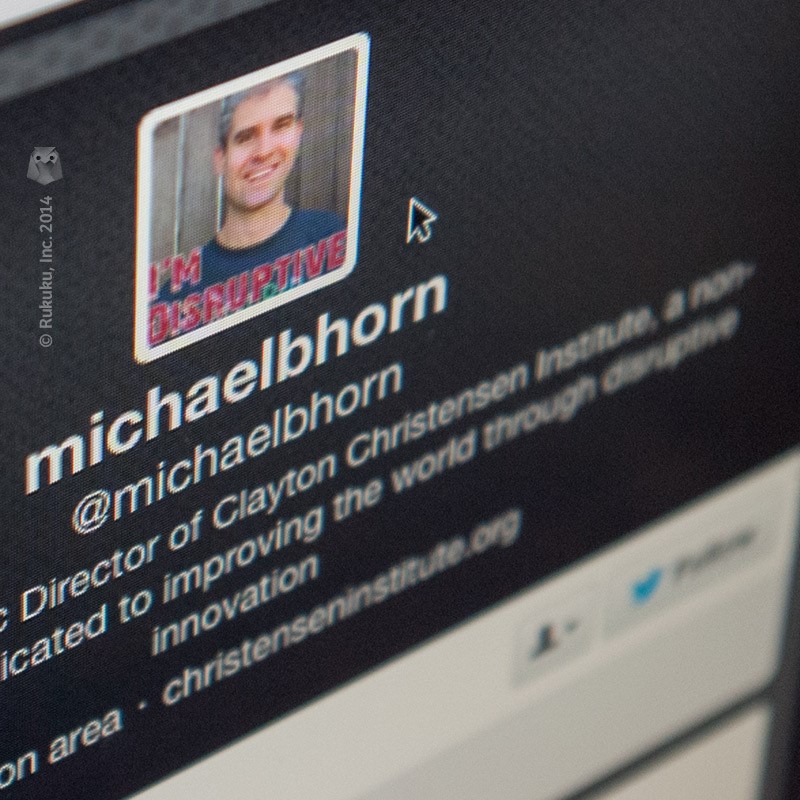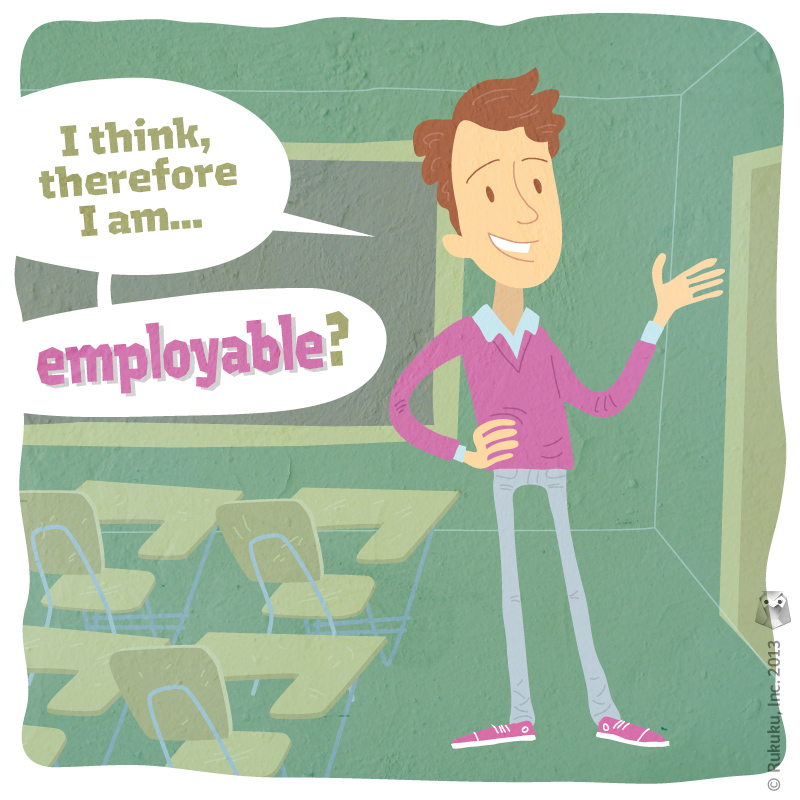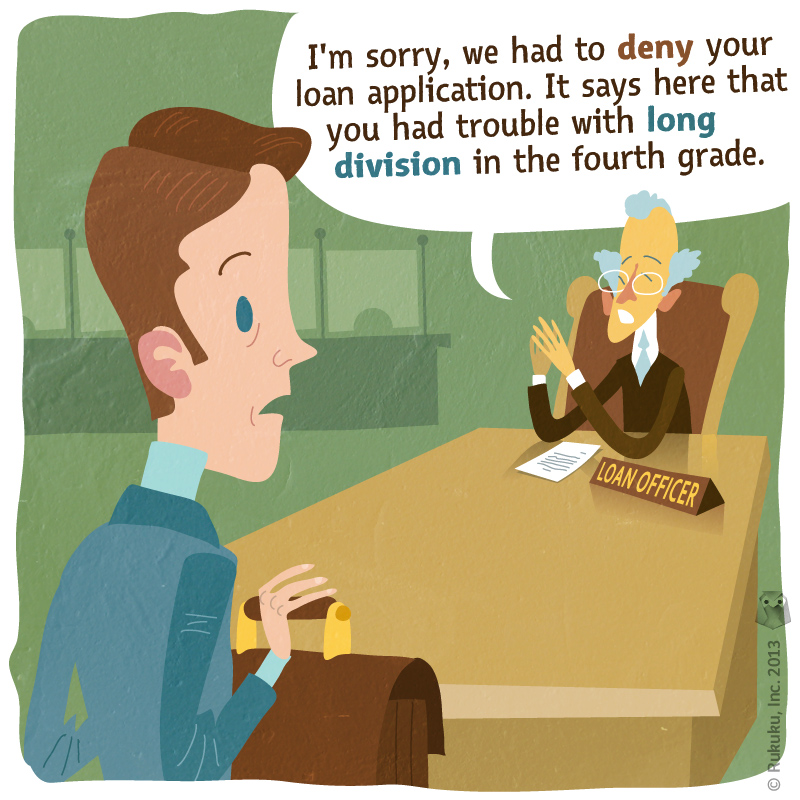Michael Horn is co-founder of the Clayton Christensen Institute and serves as the executive director of its education program. In 2008, he co-authored the award-winning book, Disrupting Class: How Innovation Will Change the Way the World Learns.

Michael Horn is co-founder of the Clayton Christensen Institute and serves as the executive director of its education program.
Q: Looking at all the various levels of education, including corporate training, higher education, secondary and primary education, where do you see the most disruptive changes taking place?
R: In many ways the corporate training market had its first wave of disruption in the late 90’s and early 2000’s during the first dot com boom. We are now to the point where we are seeing a version 2.0 of that disruption in corporate learning markets with folks like Rukuku helping people create online courses quickly, take many courses, meet training needs internally, find employees or whatever it might be. Secondarily we are seeing activity in a lot of informal spaces, like the skill-based companies that are popping up. So, I think we are starting to see a second disruption take place in the corporate learning world.
Massive disruption is definitely happening in higher education, less in respect to MOOCS at this point and more from places like Southern New Hampshire University that has introduced competency-based online learning program. University Now has one of my favorite competency-based online learning programs, as well as Western Governor’s University. Players like that are creating a wave 2.0 of disruption in the higher ed space. In K12, a lot is going on but it is more at the classroom level and less at the whole school level. I don’t see a lot that leads me to believe that schools are going to get disrupted anytime soon.
Q: Personalization is a big selling point for Edtech. Each student can learn at his or her own pace. How does that fit with traditional idea of the classroom environment?
R: I think the traditional classroom environment is going to struggle quite a bit. It was built to batch up students, lecture to them in the same way at the same pace and so forth, and therefore it is inherently not suited for this personalizing learning world. Traditional institutions are adopting some of these innovations and layering them over the traditional classroom. I think we are going to struggle to see the dramatic leaps in personalization that we might from online learning simply because it’s not what those schools and colleges are trying to do or were built to do.
Q: Do we sacrifice anything in terms of social education, the general getting along with people sort of stuff?
R: In the K-12 arena and primary schools in particular, the majority of the growth in online learning is happening in blended learning environments. The reasons for that are straight-forward as opposed to higher education. Students at that age really need a safe place to go and learn. That’s a large part of the reason we are seeing this current blend of learning.
One of the surprises as I walk into blended learning schools is the amount of socialization taking place. Students might be working individually at their computers but they are constantly bouncing up to peer tutor each other and answer questions. It frees up the teacher to spend more time setting up projects with small group instructions for students to work on with each other.
In many ways, the traditional education system does the socialization job pretty poorly because if you remember back to the experiences a lot of us had in middle school, at least for me, a lot of the social stuff that was going on was pretty negative in nature, such as passing notes around, trying to get out of the lecture with other students, and destructive things like that. What I have been stunned by is how much the interactions I have seen in these blended learning environments are really positive social ones structured around learning. I think it’s enormously more productive.
Q; You’ve written much about the difficulties for universities to manage both research and teaching. Do you anticipate these two functions diverging?
R: Outside of the elite universities, I think that is correct. Those functions will really get unbundled and people will realize that the best researching places are not in fact the best teaching places. Activities can be done differently because information doesn’t have to be centralized and so closely bundled with research anymore.
It’s an open question on what will happen in the elite universities. The major question that people are not talking about as traditional institutions change is about research. What is the right model to incentivize really good research in a sustainable fashion going forward? It’s not clear to me that the current university model is right one. It’s a very serious question for the world because so many great advances come out of the basic research done in these places. How can we make that even better?
Q: Would that have implications for intellectual property rights?
R: Yes, absolutely. People have not given deep thought to what parts of university research should be able to be monetized. It is property that you really create and intellectual ownership gives great incentives. Other research may not rise to that level or may be in such an early stage that actually having a more open source look at it would be more useful.
Q: What people or profession do you see being most radically changed by technological changes?
R: I think it’s going to be difficult, to be candid. There will be lots of roles for teachers. In fact, the number of teachers may even increase. But as we have traditionally defined them, the mid-level professors that are really focused on research and view teaching as a convoluted part of the job, often having to make these weird tradeoffs between the two. That function may go away in the years ahead and I think it will be a difficult transition.
Q: What can students and parents do to take advantage of some of the opportunities offered by online learning?
R: It’s a huge opportunity for parents right now to really be able to drive their children’s education, to navigate all the low cost opportunities and be able to expose their children to so many opportunities that previously were limited by their zip codes.
My colleague Heather Staker has written a fair amount about this and about how parents can opt out of some of the traditional ways of doing education and think about this in much more expansive and exciting ways. I think it’s an unbridled opportunity for enterprising parents.
For students who are trying to excel in schools, MOOCs could be interesting also. For example, if I am a high school student, I suspect passing MIT physics would look more impressive to a college than getting a five on the AP exam. So, thinking about how to harness those opportunities is quite interesting.
Q: Any other interesting trends that you feel like deserve more attention?
R: I would add that, in K12, we are seeing tremendous growth in blended learning. The question is, how do we help districts manage this growth in smarter ways to incentivize a focus on student outcomes? At the higher ed levels I think lot of the oxygen has been taken out by what’s going to happen to traditional institutions or MOOCs that have been affiliated with traditional institutions. An interesting question is: how do we shed more light on what some of these alternative mechanisms are for creating programs that are useful for students? And lastly, how do we help people understand that in a lot of these contexts, employers really are the end customers? A lot of the work, like Rukuku does, in connecting those nodes is something that has been overlooked somewhat in the dialogue.



